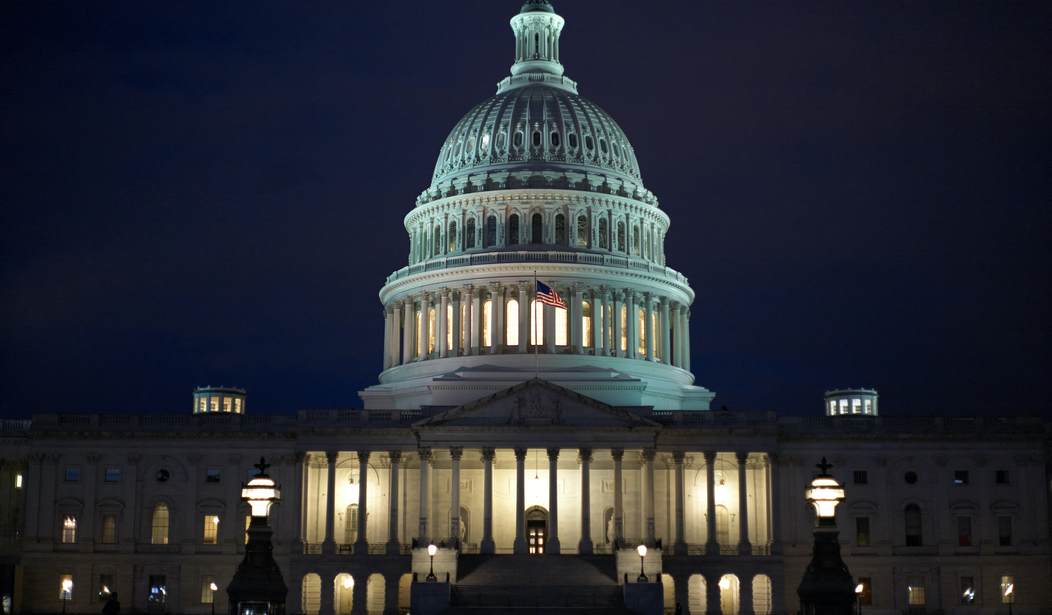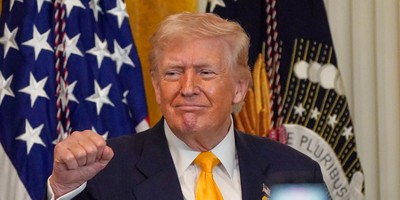Every now and then, Democrats will rant and rave once more about how the District of Columbia should become the 51st state. They've even passed bills to do so, back when they controlled the House in previous sessions. Mayor Muriel Bowser is chief among them, and has even been included as part of the Democratic Governors Association (DGA). Bowser also memorably hijacked last year's Flag Day, appropriating it as an argument to make D.C. into a state.
Mayor Bowser isn't the only Democrat to do so, though. Far from it. And it's not even Flag Day or close to it, which isn't until June 14. Yet on the morning of January 30, as our friends at Twitchy highlighted, Sen. Elizabeth Warren (D-MA) thought it necessary to tweet about her desire for D.C. to become the 51st state.
D.C. should be a state.
— Elizabeth Warren (@ewarren) January 30, 2023
"D.C. should be a state," she proclaimed from her campaign account. That's it, that's the tweet. It's not part of a thread or mentioned as part of any larger news story. She just wants two more almost certainly Democratic colleagues in the Senate.
The tweet received over 16,000 replies calling her out for such a take.
you're already in a state of denial and fraud, Fauxkahontas
— Tony AJB FJB Bruno (@TonyBrunoShow) January 31, 2023
Isn’t your one job to uphold the Constitution which categorically states the opposite?
— The Redheaded libertarian (@TRHLofficial) January 30, 2023
No, it shouldn’t. It should have ZERO residents.
— Nan Hayworth, M.D. (@NanHayworth) January 31, 2023
You understand absolutely nothing about the Constitution, Senator Warren, and you prove it every day. https://t.co/eWyBEwvXYI
Draft a constitutional amendment and stop with the sound bites.
— Jason Roberge (@JasonRobergeVA) January 30, 2023
No. It can barely govern itself.
— Jim Stinson (@jimstinson) January 30, 2023
It makes no sense to make a single city its own state. So, if it weren’t unconstitutional, DC should be absorbed by Maryland.
— Bonchie (@bonchieredstate) January 31, 2023
But Liz wouldn’t want that because it’s not really about that. It’s about rigging the system to get two more Democrat senators. https://t.co/8CoTgswyO7
You should read the constitution. And then sit down.
— Drew Berquist (@drewberquist) January 30, 2023
The reasons for opposing D.C. statehood are not merely to dunk on Sen. Warren. As many pointed out in their replies or quoted retweets, such a move is actually unconstitutional, regardless of how House Democrats in previous sessions thought they could just ignore that inconvenient reality.
Recommended
This is nothing new, nor is it new to try to address this question. A Heritage Foundation report from August 27, 1993 noted that D.C. statehood is not possible without a constitutional amendment.
As attorney R. Hewitt Pate wrote in the archived report, with original emphasis:
What most statehood proponents ignore, however, is a fundamental question that should precede their political campaign: even if it were a good idea, can Congress make D.C. a state without a constitutional amendment? As a partisan matter, support for statehood is almost exclusively Democratic, as would be New Columbia's congressional delegation. As a constitutional matter, however, the Justice Department under both Democratic and Republican administrations has consistently agreed that statehood for the District requires a constitutional amendment; it cannot be done by mere majority vote in Congress. A review of the District's history, the terms of the Constitution, and the practicalities of making D.C. a state, reveals that statehood legislation is ill-conceived at best.
It's also not as simple as just adding another state to the union, as was most recently the case with Alaska and Hawaii in 1959. Emphasis is once more Pate's:
Statehood proponents correctly point out that Article IV, Section 3 of the Constitution provides that the Congress may admit new states to the Union. That has obviously been done 37 times since the Constitution was adopted. Twenty of these 37 added states achieved admission after first obtaining an enabling act from Congress giving congressional approval of the plan. Enabling acts allowed Congress to examine whether the territory seeking admission had the economic viability and the other attributes that made statehood appropriate. Following this endorsement, the process of drawing up a state constitution, having it ratified, an d creating a structure of state government went forward.
The District has pursued a different path, one taken by only six of the 37 states admitted to the Union after the Constitution was ratified. This process of seeking statehood is known as the "Tennessee Plan." Traditionally, the Tennessee plan involves four steps. First, a state constitutional convention is convened and a constitution drafted. Second, the constitution is put to a vote and ratified by the voters of the territory seeking admission. Third, a petition is sent to Congress requesting statehood. Finally, "shadow" senators and representatives are elected to lobby Congress, in hopes of a congressional vote for admission.
Pate also lists out issues concerning not just one, but three parts of the Constitution, including Article 1, Section 8 when it comes to Congress' authority. Then there's Article IV, Section 3 which addresses Maryland, which, as Pate describes it, "provides that no new state may be created out of the territory of an existing state without that state's permission. Under this clause, doesn't Maryland need to give permission before a state can be created out of the District? It gave the territory that became the District to the federal government for use as the seat of government, not for making a new state."
There's also the 23rd amendment, which has to do with the electoral votes allotted to D.C. voters. "Perhaps the most difficult constitutional problem facing the District is its very own constitutional amendment," Pate's report noted.
The report, as did many of the tweets above, made mention of Maryland and Virginia previously as well, in that "as most of us learned in grade school, the District was created in 1790 from ten square miles of land ceded to the federal government by Maryland and Virginia. It appears Pate was giving future Sen. Warren too much credit, though. "The purpose of the District is stated in Federalist No. 43. The Framers of the Constitution believed that the federal government needed to have control over the seat of government--over the place where it was to conduct its business--so that it would not find itself beholden to a particular state government for its day-to-day needs. The states, after all, are (or at least were then) independent sovereigns jealously guarding their political power against federal intrusion from Washington."
More recently, Terry Jeffrey also brought up the role that Maryland plays in a column from last week, around the time Sen. Tom Carper (D-DE) introduced the Washington, D.C. Admission Act.
As Jeffrey laid out when it comes to his solution:
There is a better way to fix this than to remake our Capitol city -- which was designed to be independent of any state -- into a state of its own.
Call it the Taylor solution. Just as Congress in 1846 gave back to the state of Virginia the territory it ceded to create the District of Columbia, Congress can now give back to Maryland most of the land it ceded to create the Capitol. The territory in the District of Columbia that the Democrat-controlled House envisioned making into a new state can instead become a congressional district in Maryland.
Republican Rep. Dusty Johnson of South Dakota introduced legislation in the last Congress -- the District of Columbia-Maryland Reunion Act -- that would essentially do just that. He was joined by 25 co-sponsors.
Warren isn't the only senator to tweet about D.C. statehood. Sen. Tom Cotton (R-AR) has long been vocally opposed to making D.C. the 51st. Earlier this month he tweeted that it "must never become a state," and with much more context than Sen. Warren's tweet had.
Record carjackings in Washington D.C., and what's the city's response? Reduce the penalty for carjacking.
— Tom Cotton (@TomCottonAR) January 17, 2023
Another reason Washington D.C. must never become a state.
What D.C. has sadly been in the news lately is that their city council has gone for an even more soft on crime stance, despite experiencing particularly high crime rates in recent years. Just earlier this month, as Julio reported, the council voted 12-1 to override Mayor Bowser's veto of a crime bill that eliminates most mandatory minimum sentences, allows for jury trials in almost all misdemeanors, and has lesser penalties for burglary, robbery, carjacking, sexual assault, and illegally carrying a gun.
The vote took place on January 17, 2023, the same day that Cotton sent out such a tweet.

























